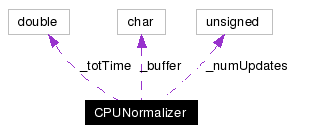
#include <abkcpunorm.h>
Collaboration diagram for CPUNormalizer:

Public Member Functions | |
| CPUNormalizer () | |
| ~CPUNormalizer () | |
| void | update () |
| double | getNormalizingFactor () const |
| operator const char * () const | |
Static Private Attributes | |
| unsigned | _numUpdates = 0 |
| double | _totTime = 0.0 |
| char | _buffer [80] |
Definition at line 47 of file abkcpunorm.h.
|
|
Definition at line 54 of file abkcpunorm.h. References _numUpdates, and update().
00054 { if (_numUpdates==0) update(); }
|
Here is the call graph for this function:

|
|
Definition at line 55 of file abkcpunorm.h.
00055 {};
|
|
|
Definition at line 60 of file abkcpunorm.cxx. References _numUpdates, _totTime, and oneUpdateTakesXUltra1sec. Referenced by operator const char *(), and operator<<().
00061 { return (_numUpdates * oneUpdateTakesXUltra1sec) / _totTime; }
|
|
|
Definition at line 63 of file abkcpunorm.cxx. References _buffer, _totTime, and getNormalizingFactor().
00064 {
00065 if (_totTime<0) strcpy(_buffer," CPU time normalizer failed \n");
00066 else
00067 sprintf(_buffer,
00068 "# Run-time conversion to Ultra-1 @143.5/71.5MHz, SunProCC4.2/-O5 : %f \n",
00069 getNormalizingFactor());
00070 return _buffer;
00071 }
|
Here is the call graph for this function:

|
|
Definition at line 73 of file abkcpunorm.cxx. References _numUpdates, _totTime, Timer::getUserTime(), Timer::stop(), and updateSize. Referenced by CPUNormalizer().
00074 {
00075 Timer tm;
00076 if (_numUpdates>10000) { _numUpdates=0; _totTime=0.0; }
00077
00078 unsigned *sample1, *sample2, *sample3; // *sample4, *sample5;
00079 sample1=new unsigned[updateSize];
00080 sample2=new unsigned[updateSize];
00081 sample3=new unsigned[updateSize];
00082 //sample4=new unsigned[updateSize];
00083 //sample5=new unsigned[updateSize];
00084
00085 RandomRawUnsigned ru("CPUNormalizer::update(),ru",999);
00086 for(unsigned k=0; k!=updateSize/3; k++)
00087 {
00088 unsigned addr=ru%updateSize;
00089 sample1[addr]=k / 3;
00090 sample2[addr]=k*k;
00091 sample3[addr]=0;
00092 // sample4[addr]=0;
00093 // sample5[addr]=0;
00094 }
00095 delete[] sample1;
00096 delete[] sample2;
00097 delete[] sample3;
00098 //delete[] sample4;
00099 //delete[] sample5;
00100
00101 /*list<unsigned> sampleList(sampleVec.size());
00102 copy(sampleVec.begin(),sampleVec.end(),sampleList.begin());
00103 */
00104 tm.stop();
00105 double newTime=tm.getUserTime();
00106 if (newTime>0) _totTime+=newTime;
00107 else _totTime = -1.0; // failed
00108 _numUpdates++;
00109 //cout << "CPU sampling took : " << tm << endl;
00110 }
|
Here is the call graph for this function:

|
|
Definition at line 58 of file abkcpunorm.cxx. Referenced by operator const char *(). |
|
|
Definition at line 56 of file abkcpunorm.cxx. Referenced by CPUNormalizer(), getNormalizingFactor(), and update(). |
|
|
Definition at line 57 of file abkcpunorm.cxx. Referenced by getNormalizingFactor(), operator const char *(), and update(). |
 1.3.2
1.3.2